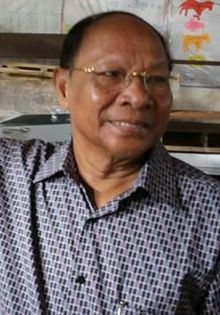Heng Samrin
|
His Excellency Samdech Akeak Moha Ponhea Chakrei Heng Samrin MP |
|
|---|---|
 |
|
| 4th President of the National Assembly | |
|
Assumed office 21 March 2006 |
|
| Monarch | Norodom Sihamoni |
| Prime Minister | Hun Sen |
| Vice President |
Nguon Nhel Say Chhum Khuon Sodary Kem Sokha |
| Preceded by | Norodom Ranariddh |
| General Secretary of the Kampuchean People's Revolutionary Party | |
|
In office 5 December 1981 – 17 October 1991 |
|
| Preceded by | Pen Sovan |
| Succeeded by | Chea Sim, as President of the Cambodian People's Party |
| Chairman of the People's Revolutionary Council | |
|
In office 7 January 1979 – 6 April 1992 |
|
| Prime Minister |
Pen Sovan Chan Sy Hun Sen |
| Preceded by | Position established |
| Succeeded by | Chea Sim, as Chairman of the Council of State |
|
Member of Parliament for Kampong Cham |
|
|
Assumed office 26 July 1998 |
|
| Personal details | |
| Born |
25 May 1934 Ponhea Kraek, Kampong Cham, Cambodia |
| Political party | Cambodian People's Party |
| Spouse(s) | Sao Ty |
| Children | 4 |
| Religion | Buddhism |
Heng Samrin (Khmer: ហេង សំរិន; born 25 May 1934) is a Cambodian politician who was the de facto leader of the Hanoi-backed People's Republic of Kampuchea from 1979 to 1981 and General Secretary of the Kampuchean People's Revolutionary Party from 1981 to 1991. He has been the President of the National Assembly of Cambodia since 2006; he is also Honorary President of the Cambodian People's Party (CPP) and a Member of Parliament for Kampong Cham Province. Heng Samrin is Cambodia's oldest parliamentarian, at 82 years of age. His honorary title is "Samdech Akeak Moha Ponhea Chakrei Heng Samrin" (Khmer: សម្តេចអគ្គមហាពញាចក្រី ហេង សំរិន).
Heng Samrin was born in Kampong Cham Province, Cambodia, in 1934. He joined the Khmer Rouge communist movement led by Pol Pot, and became a political commissar and army division commander when the Khmer Rouge, backed by China, took over the government in 1975. In 1978, after a series of violent purges within the Khmer Rouge leadership in which many prominent cadre members whom Pol Pot felt might be rivals were executed, he fled to Vietnam. In Vietnam he was one of the founding members of the Kampuchean United Front for National Salvation (FUNSK). Later that year, Heng returned to Cambodia and organized a resistance movement with the backing and support of Vietnam and the Soviet Union.
...
Wikipedia
